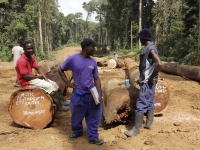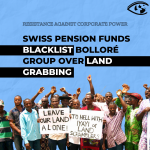Blue Carbon Buys Up Rights to Control Forest Lands Across Africa

Logging in RiverCess, Liberia. Photo: Flore de Preneuf/PROFOR. Used under Creative Commons license.
Blue Carbon, a carbon trading company based in the United Arab Emirates (UAE), has emerged as a major winner at the global climate change conference (COP28) just concluded in Dubai. It has struck deals across Africa that give it the right to control forestry activities by local communities.
Founded just one year ago, Blue Carbon has bought up land rights equal to the size of the UK – including over 20 percent of Zimbabwe, 10 percent each of Liberia and Zambia and 8 percent of Tanzania, according to the Guardian newspaper. It is owned by Sheikh Ahmed Dalmook al-Maktoum, a member of the royal family of Dubai, one of the seven UAE emirates. (Al-Maktoum also invests in fossil fuel projects such as a crude oil processing and marine fuel trading business in Fujairah, that it bought from Uniper earlier this year.)
“Voluntary carbon markets can drive real, on the ground effective climate action . . . with significant co-benefits to climate, local communities and nature,” Mohamed Ben Salem, the lead negotiator on voluntary carbon markets for the UAE’s presidency of the climate conference, told a conference in London recently, according to the Financial Times.
What Blue Carbon has been buying up are forest lands that have the capacity to absorb large quantities of carbon dioxide generated by fossil fuels. Blue Carbon is hoping to sell the rights to “protect” these forests from logging or other extractive industries to wealthy countries like Germany or the UK. The idea is that the buyers, who typically produce a large amount of greenhouse gases, will pay top dollar to offset their carbon footprint under future international climate agreements.
“They're buying a license to pollute. And that licence to pollute is called the carbon market," Fadhel Kaboub, a senior adviser with Power Shift Africa, told Middle East Eye. "[But] what happens is that communities on the front line are frequently displaced. We're talking about pastoral communities... communities that have ancestral land that they no longer have access to, and these are not the communities that cause climate change or contribute to climate change.”
Community groups in Liberia are already up in arms over a deal with Blue Carbon that has locked away forests in Gbarpolu, Lofa, Margibi, RiverCess and Sinoe counties. Under the terms of the deal with Liberia, Blue Carbon gets paid 70 percent of the royalties for the first decade while the government gets the remainder. After ten years, the two partners split the profits equally.
However the agreement does not spell out how the carbon credits will be certified or valued. Local community groups also say nobody asked them about the deal.
“We want to know the calculation. If I get 57,000 hectares preserved as carbon area, what will be the calculation? Through what kind of benefit-sharing mechanism?” Matthew Walley, a local forestry leader in RiverCess county told The Daylight environmental news website in Liberia. "We think we should be contacted and we should be a part because carbon has something to do with the community people."
And stories have already begun to emerge that local governments in other countries are evicting communities who use these forests, such as the Ogiek community in the Mau forest of Kenya, who were kicked off their lands in early November, to fulfill the terms of a carbon offset agreement. (Blue Carbon denies that it is involved in the Mau Forest).
"We tried to ask for time to remove our property from the houses. They refused - we do not know where to go,” Elisabeth Nguliso was quoted as saying by the BBC. “We ask the Kenyan government to remember us, to give us back our lands, this will also help them conserve the other areas. If you tell me to leave, I do not know where I will go."
“The Ogiek are on the front line of a false climate solution that is used to justify ongoing evictions and emissions," Dr Justin Kenrick from the Forest People's Programme told the BBC. "Those in control of Africa's forests stand to earn a lot of money.”
Activists warn that similar evictions are certain to happen. "In Kenya... there are no large chunks of land where there are not people," Hellen Kahaso Dena, a campaigner for Greenpeace told Middle East Eye. “[But] if there's a government project on that land, it doesn't matter whether you have a title deed.”
Indeed some experts note that carbon trading is just as devastating as other forms of extraction. “The [methods] of exploitation might be new but the consequences are not so different to the last 200 years of land grabs in Liberia,” David Young, an independent expert on civil society’s role in forest governance in Liberia, told the Financial Times. “The promises to the communities are vague and unpredictable and it’s like logging or mining or palm oil all over again.”
Governments are well aware of the potential profits. “The size of the carbon stock is huge, so anybody will be tempted to sell our carbon,” Wilson Tarpeh, head of Liberia’s Environmental Protection Agency, which recently signed a major agreement with Blue Carbon, told the Financial Times. “But it has to be a rules-based system. It’s not like buying a candy bar.”
But what’s worse is the fact that many of these so-called green solutions have failed to meaningfully reduce carbon emissions. An investigation conducted by Die Ziet newspaper, the Guardian newspaper and Source Material, an NGO, showed that over 90 percent of the carbon credits approved by Verra, the leading certifier of carbon offsets, were bogus: just 5.5 million of 94.9 million credits were reducing carbon emissions.
"Companies are using credits to make claims of reducing emissions when most of these credits don’t represent emissions reductions at all," Barbara Haya, the director of the Berkeley Carbon Trading Project, told the Guardian newspaper.



